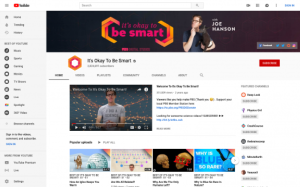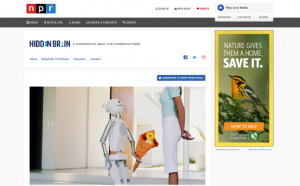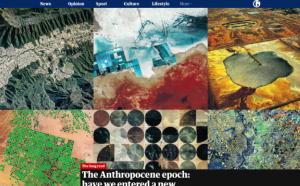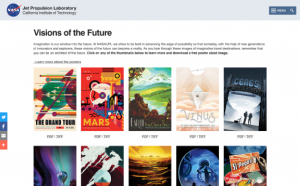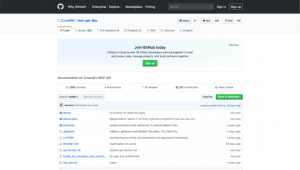Theme: LGBTQ Pride
Back to Top
|
 |
|
The Sound of Pride: Stonewall at 50
|
Social studies |
|
This year marks the 50th anniversary of the Stonewall uprising in New York City, an event that many view as the start of the LGBTQ civil rights movement. To commemorate the uprising, throughout June 2019 New York Public Radio (WNYC) is presenting The Sound of Pride, a special programing series "that captures the spirit, history, impact, and voices of the LGBTQ movement." Here, readers will find podcast episodes and radio segments produced by a variety of WNYC shows, as well as relevant blog posts from WQXR (New York City's classical music station) and upcoming live events. The series covers a wide range of topics, including a review on The New Yorker Radio Hour about "how the movement for LGBTQ rights has changed our culture and our laws," a discussion on The Takeaway about the relationship between police departments and LGBTQ communities, and an episode from the acclaimed podcast Nancy presenting "three stories about different kinds of coming out." Those interested can stream and download these episodes and more online or subscribe to the podcast via Stitcher, Spotify, RadioPublic, or other platforms. [JDC] |
|





|
|
 |
|
Where Love Is Illegal
|
Social studies |
|
Launched in 2015, Where Love Is Illegal is a global campaign that "documents and captures personal testimonies of survival from the LGBTQI+ community around the world." Here, visitors can find dozens of personal stories and statements conveying both struggle and resilience from people in countries such as Nepal, Ghana, Armenia, Peru, and the United States. Some of these testimonies are accompanied by evocative portrait photography, while others have candid snapshots. As this project points out, "72 countries around the world have criminal laws against sexual activity by lesbian, gay, bisexual, transgender or intersex people." On the World Map page, visitors can click on many (though not all) countries to see a summary of their laws and statistics regarding LGBTQI+ rights, as well as a link to stories from that particular country. For example, although the West African country of Gabon has never outlawed homosexual activity, same-sex couples "are not eligible for the same legal protections available to opposite-sex couples." Where Love Is Illegal is a project by Witness Change, a nonprofit founded by photojournalist Robin Hammond that aims "to end human rights violations for marginalized communities through visual storytelling." [JDC] |
|





|
|
 |
|
LGBT Materials in the New York Public Library
|
Social studies |
|
New York City is an important location in the history of LGBTQ activism, so it's not surprising that New York Public Library has a wealth of materials documenting the movement. LGBTQ Materials in the New York Public Library is a super-collection, composed of hundreds of documents, photographs, post cards, and more. Many of these items were originally archived by the International Gay Information Center (IGIC) and donated to the New York Public Library in 1988. Subsequently, other archives and collections were also added. Readers may want to begin with the About section, which gives an historical overview of New York City's activist groups from 1950s through the '90s and offers related resources for those looking to learn more. To browse the collection, readers can use the Navigation section, which features drop-down menus specific to particular groups and individuals within which users may view by material type. Some of the activists and organizations represented include Act UP New York, photographer Diana Davies, and artist Emilio Sanchez. Those interested in a more selective search can also use the Filters section to navigate by material topic, collection name, genre of media, and more. [DS][EL] |
|





|
|
 |
|
LGBTQ Video Game Archive
|
Social studies |
|
Readers interested in diverse representation in popular culture may be interested in the LGBTQ Video Game Archive, a research project that describes itself as a "curated collection of information about LGBTQ and queerly read game content." Visitors should begin with the About page (found under the Home menu), which explains the project's central goal, method, and scope, as well as its limitations. Under Games, readers can view the games identified as having queer content by game series, with listed series containing more than one game with LGBTQ references. The site also compiles relevant digital and non-digital games by decade of release, dating back to the 1970s. On both lists, game titles that the Archive's team has been able to research are linked to "posts synthesizing information about each type of LGBTQ content in the game/game series." Readers can also browse the site by LGBTQ content categories such as characters, Easter eggs, or homophobia/transphobia. The Resources section offers helpful information like category descriptions, links to glossaries, and a bibliography of relevant academic research. As of this write-up, the project has identified over 1,000 games with queer content and has completed research on roughly 300 of them. The LGBTQ Video Game Archive is led by Adrienne Shaw, an associate professor in the Department of Media Studies and Production at Temple University. [JDC] |
|





|
|
 |
|
The Trevor Project
|
Social studies |
|
Educators, school counselors, parents, and young people may want to check out The Trevor Project, a national organization whose mission is "to end suicide among gay, lesbian, bisexual, transgender, queer & questioning young people." In addition to their valuable crisis helplines for suicide prevention, The Trevor Project provides other resources such as their Lifeguard Workshop, which is a free educational curriculum that aims to help adults create a supportive environment for LGBTQ youth and includes a video and downloadable lesson plans. Another valuable resource featured here is a Model School District Policy that was developed to "help educators and school administrators implement comprehensive suicide prevention policies," both of which can be found under Education. Readers should also visit the Resources section, which features helpful information about preventing suicide, such as how to recognize warning signs and risk factors, as well as the Trevor Support Center, a collection of knowledge for LGBTQ youth and their allies about identity, relationships, mental health, and more. Founded in 1998 by filmmakers Peggy Rajski and Randy Stone and writer James Lecesne, The Trevor Project was named after their Oscar-winning short film Trevor, which interested readers can watch in its entirety on the History & Film page (found under About). [JDC] |
|





|
|

